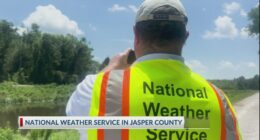Share this @internewscast.com
Two government-run efforts to distribute free COVID-19 tests and to offer free courses of Pfizer’s Paxlovid antiviral are set to end Friday, as trends of the virus have largely slowed.
The Administration for Strategic Preparedness and Response, or ASPR, will stop accepting orders to ship COVID-19 tests to all households through the U.S. Postal Service, an agency spokesperson confirmed, marking an end to this season’s round of shipments.
“ASPR has delivered over 1.8 billion free COVID-19 tests to the American people through COVIDTests.gov and direct distribution pathways and will continue distributing millions of tests per week to long-term care facilities, food banks, health centers, and schools,” the spokesperson said.
This year’s free COVID-19 tests program is coming to a close earlier than last year. In 2023, orders for tests were accepted through the end of May.
Slowing case rates drove the decision to pause orders for the sixth round of test shipments, the spokesperson said. Tests could still be distributed again by ASPR in the future.
The CDC said on March 1 that some COVID-19 trends remain elevated nationwide but have been decreasing in recent weeks from last winter’s peak.
It comes days after the Centers for Disease Control and Prevention acknowledged in new guidance that rapid “antigen” tests – like the kind in the USPS program – had “relatively low” sensitivity, with “significant numbers of false negative” results early during an infection.
“If it’s positive, we see very few false positives, we know that you have COVID. But it is still possible to have a false negative. So it can be reassuring, but it is not a guarantee that you don’t have COVID if you see a negative,” CDC Director Dr. Mandy Cohen told CBS News.
All pandemic-era supplies of Paxlovid are also scheduled to expire Friday, following a decision earlier this year by the Food and Drug Administration to wrap up the transition of Pfizer’s COVID-19 treatment into the private market.
FDA documents show Pfizer had asked to end emergency use authorization as early as January for the government-bought pills, which have been free to all Americans. Citing concerns that this cutoff could result in an “acute lack of availability,” the FDA said it would delay it until March.
How can I still get COVID-19 tests for free?
A program run by the National Institutes of Health and ASPR called Home Test to Treat still offers free at-home tests to uninsured or underinsured adults, as well as those on Medicare, Medicaid, the Veterans Affairs system or Indian Health Services.
The home molecular tests delivered by that program – Pfizer’s Lucira test for COVID-19 and flu – are more sensitive than other kinds of at-home rapid antigen tests that had been shipped from the USPS orders.
That program is set to wind down in mid-April, a spokesperson for the NIH’s National Institute of Biomedical Imaging and Bioengineering told CBS News.
The CDC’s Increasing Community Access to Testing program, which subsidizes free testing for uninsured Americans, is also still running at thousands of pharmacies. Funding for that program has been set aside until May 2025, officials have said.
“We have testing sites in all 50 states, including D.C. and Puerto Rico. We have about 10,000 active testing sites and any given week, about 2,000 to 2,500 sites are testing,” the CDC’s Joseph Miller said at a January meeting of the agency’s advisers.
How can I still get Pfizer’s Paxlovid for free?
Federal officials have stressed for months that Americans will still have ways to get free or reduced-price Paxlovid under their deal struck with Pfizer, even after supplies of the COVID-19 treatment finish switching over to the private market this month.
All adults insured by Medicare, Medicaid, TRICARE and the Veterans Affairs Community Care Network are eligible to get free Paxlovid through the end of 2024 from Pfizer through a government-backed patient assistance program. Uninsured Americans are also eligible.
Others with private insurance are still able to request free or reduced price Paxlovid or rebates through Pfizer’s PAXCESS program, if their insurance does not cover the cost of their pills.
“Bottom line is no one should be paying full price for Paxlovid,” ASPR’s Meghan Pennini told a National Press Foundation event in January.














